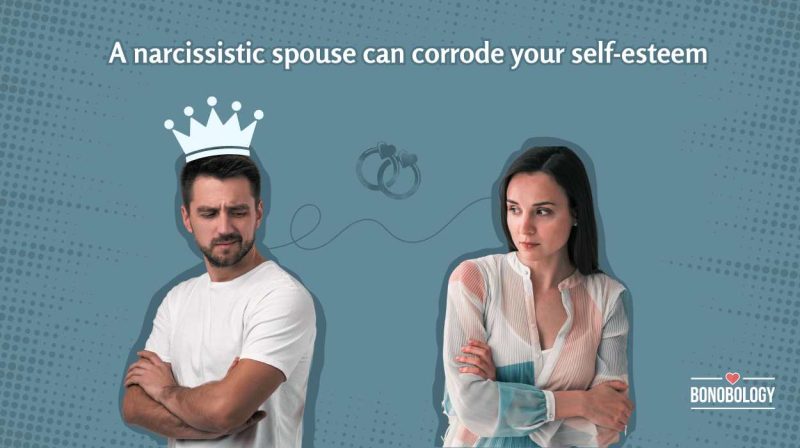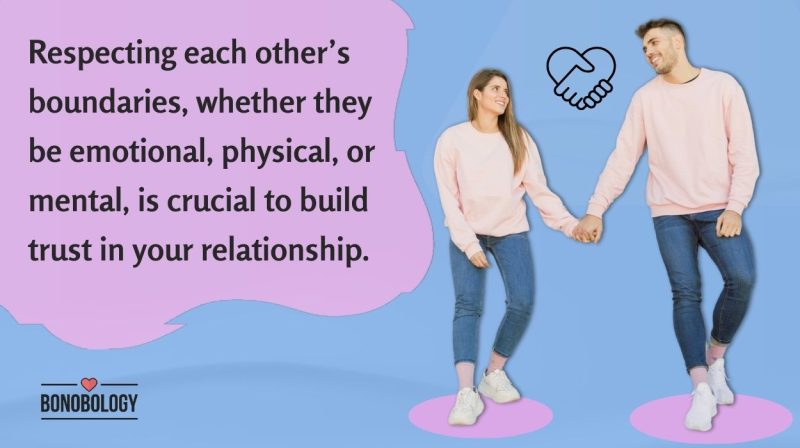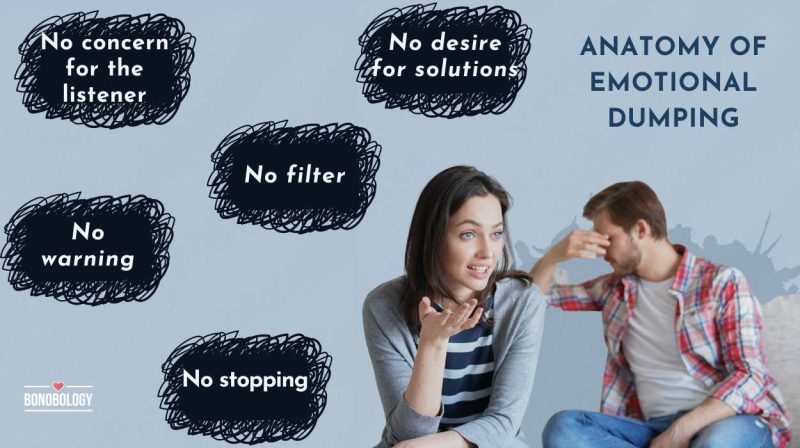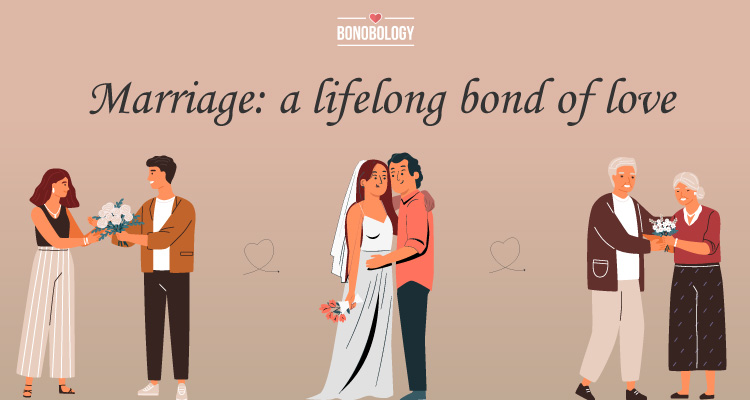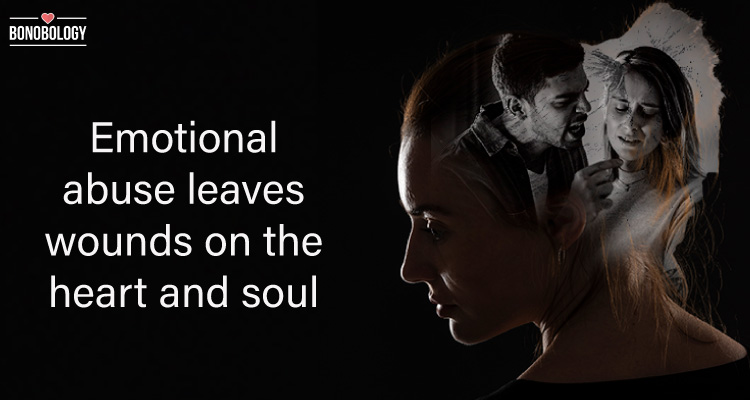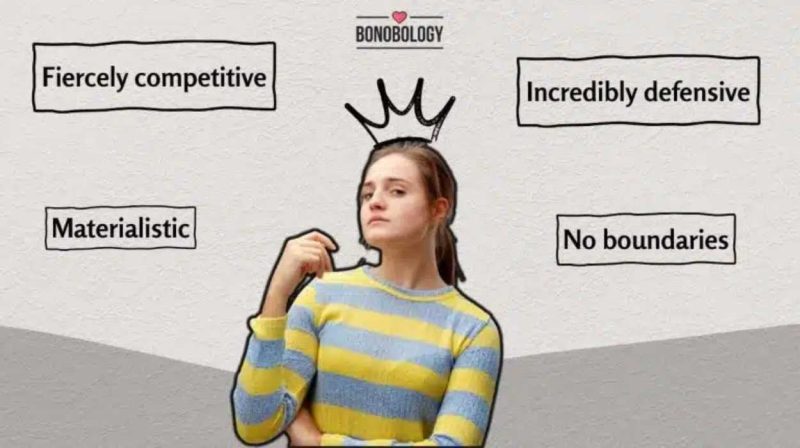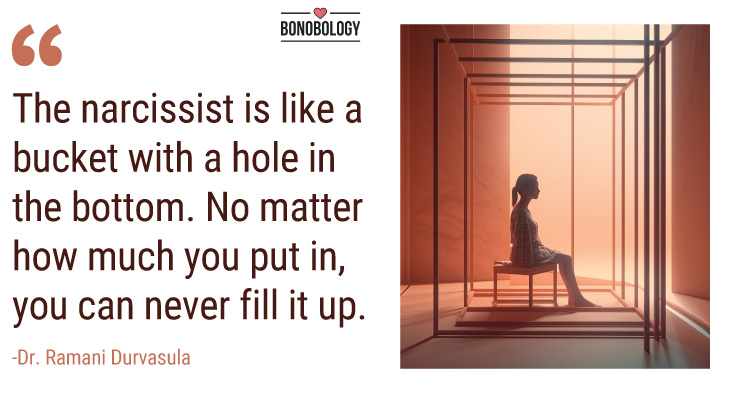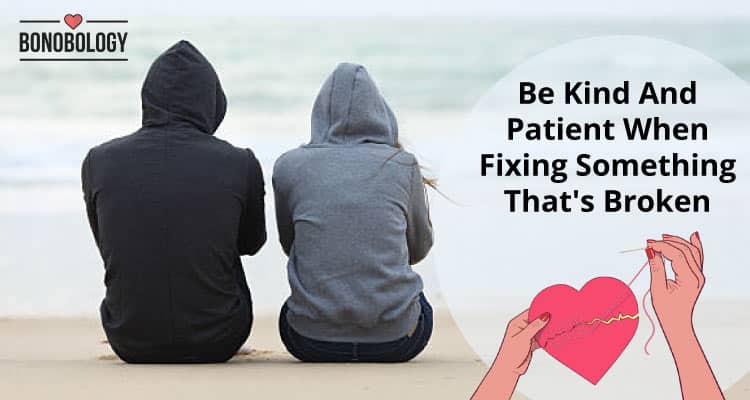Being consumed by the needs of a spouse and feeling compelled to fix them is among the tell-tale indicators of a codependent marriage. However, people tend to dismiss signs of codependency with statements like:
- “I’m too independent to be codependent”, or
- “How can I be codependent when I’m the one my partner leans on for support and help?”
Whether it is rooted in denial or lack of understanding, unresolved codependency is neither healthy nor sustainable. It can even lead to serious relationship problems or divorce, research indicates. So how can we spot and fix relationship codependency?
In this article, psychotherapist Gopa Khan (Masters in Counseling Psychology, M.Ed), who specializes in marriage and family counseling, sheds light on the question: what does codependency look like, the difference between healthy love vs. codependency. She also shares examples of codependency and provides tips on how to overcome codependency in a marriage.
What Is Codependency In Marriage?
Table of Contents
The term “codependent” was initially used to describe the relationship patterns of people in love with or sharing a life with addicts or alcoholics. In fact, these patterns were first recognized by the wives of Alcoholics Anonymous (AA) members, according to research. While that paradigm still stands, psychologists now agree that codependency can be at the core of other dysfunctional relationships as well. So, what is codependency in marriage? Codependency in marriage can be described as a state where:
- One partner becomes overwhelmingly busy taking care of the other — to the point of self-neglect or physical and emotional exhaustion
- They pour everything into the relationship, obliterating their needs, boundaries, and eventually, their sense of self
- They explain away, minimize, or enable their partner’s poor behaviors
- They feel responsible for their partner’s moods and actions and try to rescue, fix, or control them or their problems
- They are so attached to the idea of making the relationship work that they’re willing to go to any lengths to get the attention and love they desperately seek
- Over time, their unhealthy relationship dependence takes a toll, pushing them into a crushing identity crisis
What does codependency look like?
What does codependency look like in a marriage? “If you think of marriage as a Venn diagram, then two circles that overlap in the middle represent a balanced relationship. The kind where two people in love retain a healthy sense of identity, self-worth, and partnership,” Gopa says, adding, “In a codependent marriage, the circles overlap to such an extent that they appear to be merged.”
Here, the partners’ sense of identity and self-worth get welded together. Since the relationship is all-give and all-take, there is also a notable imbalance in met needs. Unlike in healthy interdependent relationships, the emotional and physical needs of one partner completely dominate the relationship dynamics. This happens because when there are two codependents in a relationship, one of them starts:
- Ignoring healthy boundaries/failing to set boundaries and becoming completely preoccupied with their SO
- Compromising their needs and altering their behavior more and more to keep their partner happy and sustain the relationship
- Feeling exhausted and trapped in the relationship as their partner starts to feel entitled to all their time and energy; their self-esteem hits rock bottom; and anxiety, anger, resentment, and stress shoot up

What causes codependency?
Codependency is a learned behavior whose roots can usually be traced to unmet physical and emotional needs in childhood as well as early life experiences. Here is what causes codependency to take in relationships:
- Parenting styles: Both overprotective and underprotective parenting can cause children to develop insecure attachments and signs of codependency. Overprotected children seek constant validation. They also never learn to make decisions or manage their emotions. All are traits of a codependent personality. Underprotected children tend to feel unsafe, unloved, and vulnerable due to the lack of a parental security net and emotional support. This leads them to develop codependency issues like fearing being alone or rejected, appeasing people who abuse them, or feeling uncomfortable confronting others
- Codependent environments: Growing up around parents who share a codependent dynamic can cause a child to internalize poor behaviors at a young age and mirror them in adult romantic relationships. Researchers have also detected altered brain functioning in families of people with substance abuse problems and linked it with codependent tendencies
- Trauma: Studies have found that childhood trauma, be it due to emotional neglect, sexual abuse, emotional or verbal abuse, or physical abuse, is also what causes codependency. Here codependence develops as a mechanism to feel safe, gain control, or change negative feelings — though it rarely works
Related Reading: Attachment Styles Psychology: How You Were Raised Affects Relationships
11 Warning Signs Of Codependency In A Marriage
People often don’t realize they are slipping into a codependent pattern or struggle to recognize the traits of a codependent person. That’s because it is easy to confuse the signs of codependency with ‘real’ or ‘unconditional’ love — at least initially. Much of this is thanks to popular culture, which has heavily romanticized the idea of “all-consuming” passion and “losing yourself” in love.
Social constructs also make it difficult to figure out how to overcome codependency. “It is hard to identify codependency in societies where wives and mothers are supposed to ‘take care’ of their families and suppress their personalities for the ‘good’ of the family,” Gopa explains, “Due to social conditioning, a codependent wife may feel she needs to stay in her marriage, even in the face of abuse, as she considers it synonymous with her identity.” So, how do you identify if you’re dealing with codependency in marriage? Or, if you have a codependent husband or wife? Here are 11 unmistakable codependency signs:
1. There’s no difference between ‘we’ and ‘me’
This is one of the stark codependency signs in a marriage: both spouses view each other as a single entity and act as one. Eventually, their lives become so intertwined and their relationship becomes so enmeshed that they don’t know how to exist or operate as individuals. Want to know what is codependency in marriage or whether your relationship dynamic has codependent tendencies? Ask yourself:
- Do you spend time with your friends/family alone sometimes or is your partner always with you?
- Are your likes, dislikes, hobbies, interests, moods, and world views tied to your partner’s?
- Is it hard for you to make decisions without them?
- Do you feel lost or anxious if you are apart? Do you then constantly check in on them?
If you can’t quite fathom who you are outside your marriage, consider it a red flag.
Related Reading: 5 Reasons Why Space In A Relationship Is Not An Ominous Sign
2. Skewed responsibilities are among the signs of codependency
“How do I know if my spouse exhibits traits of a codependent person?” “Are we two codependents in a relationship?” If that’s what you’re asking, then look at how you both share responsibilities. In a marriage with codependent tendencies, the burden of responsibilities falls squarely on one partner, who ends up:
- Taking care of every aspect of your shared life
- Making all the plans
- Picking up all the slack, and
- Solving all the problems in the relationship as well as your individual lives
You may tell yourself that either you or they are “doing it all” out of love. However, all this is doing is enabling patterns and behaviors that do not make a healthy relationship or a healthy marriage.
3. The guilt and blame are one-way
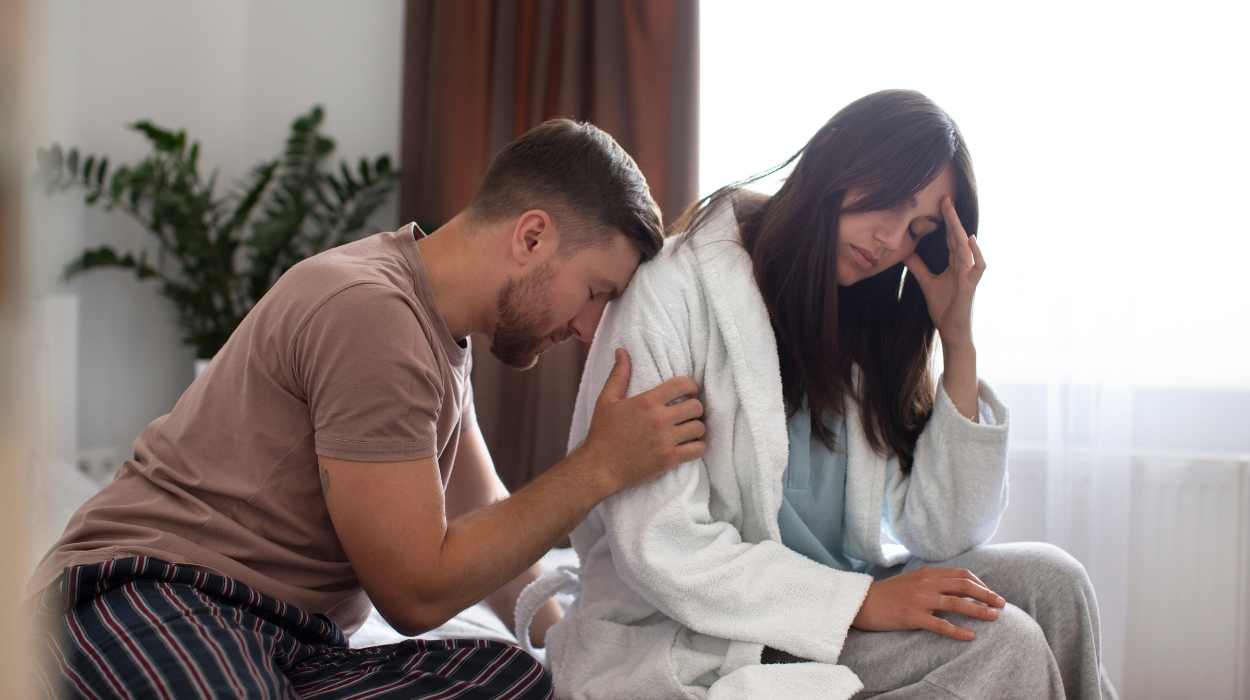
Codependency guilt is irrational. It’s also one-way. A codependent person will feel guilty or unnecessarily bad about things they haven’t done and can’t control or change. Or even things that are their partner’s fault. So, when their partner gets a DUI, they somehow feel responsible for it. Or, they obsess over how they could have done something to prevent it.
If their partner forgets to pick up the children from school, instead of holding them responsible, they beat themselves up for not reminding them. Their partners often use this tendency to escape all blame. Or, guilt them into getting what they want. When one spouse feels responsible for everything that happens to the other or lets their partner make them feel that way, it’s one of the most tell-tale examples of codependency in a marriage.
Related Reading: Is Guilt-Tripping In Relationships A Form Of Abuse?
4. Covering up for your spouse’s poor behavior
What does codependency look like? Sometimes, it looks like this:
- When one spouse misbehaves after getting drunk at a party, the other covers or makes excuses for them
- If one partner loses a large chunk of money in gambling or commits some other form of financial infidelity, like running up credit card debt, the other digs into their savings to bail them out
In such relationships, one spouse compulsively shields the other from the consequences of their actions. At times, this comes at the cost of comprising their conscience or breaking the law. And it stems from a fear of confronting, upsetting, disappointing, or losing their partner. If you are in a similar situation, remember, your partner is an adult who should know that their actions and decisions have consequences.
To break the pattern, you’ll have to allow your partner to clean up their messes, instead of trying to solve every problem for them
Gopa Khan, psychotherapist
5. One partner forgives and forgives
While forgiveness in relationships is important, it is taken to an extreme in a codependent dynamic. It also becomes the sole prerogative of just one partner. Codependents readily forgive every wrong, every mistake, every miss on their partner’s part without holding them accountable.
According to Gopa, this stems from a fear of abandonment and being alone. So, they keep absolving their partner of any wrongdoing in the hope that they will see the error of their ways or change. But unless they’re held accountable for their actions, why would they?
6. In a codependent marriage, change isn’t for the better
We all evolve with time and no one can claim to be the same person they were 5, 10, or 20 years ago. But, with two codependents in a relationship, this change isn’t for the better. Let’s understand how. When you examine what does codependency look like, you will find one thing conspicuously missing — the word no.
Codependents trade in self-esteem for validation. They feel compelled to say yes to everything their partner wants. They also spend so much time dancing to their partner’s moods and being emotionally codependent that they lose touch with their emotions. Eventually, they wind up with low self-esteem.
Their thoughts, opinions, feelings, and identities get buried so deep that they can’t reach them — even if they want to. Not saying no, letting someone dictate how you feel and act, apologizing for things you aren’t responsible for, ignoring self-care — these are all signs you are giving your power away and precursors to giving up parts of yourself. And no relationship is worth that.
Related Reading: Power Dynamics In Relationships – How To Keep It Healthy
7. There is a constant caretaker and perpetual victim
From afar, codependent couples may seem like they’re madly in love. But a closer look will show that one of them is doing most of the loving and caring. That partner usually serves as a caretaker/giver and the other takes on the role of the victim/taker in the relationship. What sets such couples apart is that:
- Neither partner steps out of their role. There is no reciprocity or healthy give-and-take
- There’s only a stark power imbalance where one person remains subservient to the other and sacrifices themselves and their well-being in the name of selfless love – to the point of exhaustion
- Two codependents in a relationship feed each other’s negative patterns
8. The giver feels lost without the ‘rescuer’ identity
Imagine this scenario. Your partner finally decides to give up alcohol or substance abuse and gets into rehab. Or, they begin working toward becoming a responsible partner who can share your burdens and offer you support. But instead of feeling hopeful and relieved by this turn of events, you feel lost and deprived.
Caring for and rescuing a partner often becomes the central focus of a codependent person’s life. They feel lost without it.
It’s not uncommon for a giver or rescuer in a codependent marriage to slip into depression or lash out when their partner decides to start making efforts to be better. They may even deliberately create chaos so that they can don the rescuer hat again. It’s also not unusual for an enabler to move on from the marriage to find someone else to ‘save’.
Related Reading: Will I Be Alone Forever? How It Feels And Ways To Get Over It
9. The fear of being alone keeps you stuck in the marriage
Sharon (name changed) was 30 and dealing with mounting parental concerns over her unmarried status when she met Jared, who was already married. He convinced her to marry him. Unfortunately, soon after the wedding, Jared turned verbally and physically abusive toward her. Though Sharon recognized the abuse, she remained in denial. She felt responsible for her situation and felt she needed to ‘accept’ it out of fear of being alone.
“This is one of the classic codependency traits in relationships, where the person feels they cannot have an alternative existence than the one they are in,” says Gopa, “Instances of young people attempting suicide when their relationship breaks because they feel they cannot move ahead in life without it are also examples of codependency. In such situations, counseling becomes crucial to recognize the patterns of healthy and unhealthy relationships.”
For codependents, the fear of being alone is often debilitating. This can even lead them to settle for an unhealthy or toxic relationship and give their all to fix it and make it work. However, no relationship can be saved without first fixing patterns that are inherently flawed.

10. Control issues and anxiety are key signs of codependency
Are codependents controlling? They can be. Codependency and control issues are often interlinked. The giver is driven to control everything — a learned behavior from growing up in dysfunctional or chaotic environments, which left them feeling out of control. They are also overly anxious, even when things are going well. And, they are constantly waiting for the other shoe to drop because that’s the pattern they’re accustomed to. The taker in a codependent relationship, meanwhile, is willing to give up all control initially but comes to resent it later.
11. Codependent spouses struggle to break away
You know something is amiss in your relationship. The constant anxiety, anger, or resentment are too pervasive to be ignored. But you just cannot bring yourself to leave the marriage and make a fresh start. Perhaps because:
- The mere thought of breaking away fills you with guilt and shame
- You’ve convinced yourself that your partner cannot survive without you. So, the thought of reclaiming your life becomes synonymous with ruining theirs, or
- The idea that your partner’s well-being is your responsibility has become so deeply entrenched that breaking away from them on your own has become near-impossible
“This is the toughest aspect of codependency in marriage as it may be true that someone may not be able to cope without their spouse. But, their spouse’s leaving may help the dysfunctional person to hit ‘rock bottom’ and seek the help they need. Nevertheless, codependency can exact a huge toll on mental health, yours as well as that of your loved ones,” says Gopa. That’s why understanding codependency, especially the codependency signs, and finding ways to fix it is crucial.
Related Reading: 15 Indisputable Signs Of A Codependent Relationship
Can A Codependent Relationship Be Saved? 6 Expert-Backed Tips That Can Help
Is codependency healthy in a marriage? Not at all. Unless love flows both ways and equally in a relationship, it cannot be called wholesome. Nor can it be described as real love. So, can a codependent relationship be saved? Can a couple overcome codependency? Yes, provided the signs and stages of codependency are spotted early and professional help or marriage advice is sought, according to this study.
If you’re trying to understand how to avoid being codependent or how to become less dependent on your partner, Gopa has some advice on ditching unhealthy dependence, healing a codependent marriage, and forming healthy relationships:
1. Reclaim your identity
“Focusing on developing your own identity, self-worth, self-image, and the concept of self is important for piecing together the puzzle of how to overcome codependency,” says Gopa. To do so, you must:
- Carve out some ‘me’ time
- Maintain your individual friendships, hobbies, and careers
- Get out of your relationship comfort zone and become comfortable pursuing some independence
Related Reading: 8 Signs You Are Losing Yourself In A Relationship And 5 Steps To Find Yourself Again
2. Focus on self-care
“The pattern of caretaking seen in codependents often gets established in childhood. Using the same skills to take care of yourself can help reduce stressors and rebuild your confidence and self-esteem,” says Gopa. To avoid being codependent and loving someone to exhaustion, try to:
- Be kinder to yourself and learn to love yourself
- Intentionally explore your core values and what you want from a relationship
- Make a habit of stating what you want and checking in with how you’re feeling regularly
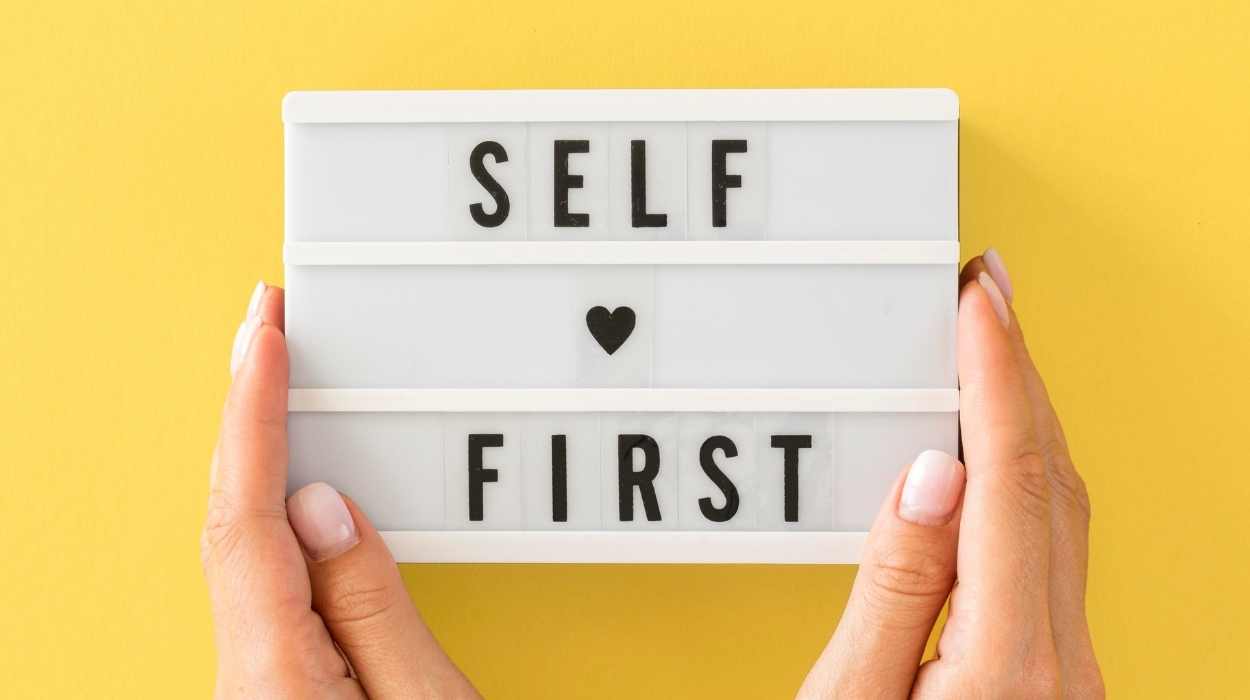
3. Reframe what you’re responsible for and what you aren’t
According to Gopa, to figure out how to overcome codependency lies, you must:
- Acknowledge that you are not responsible for your partner’s messes
- Stop thinking that only you can fix their problems
- Avoid making your loved ones depend on you to the point they can’t take care of themselves
- Understand that if a person is abusive, using substances, or cheating, they alone are responsible for their behavior
- Shake off the tendency to feel guilty or hide/cover up your situation from other family members
Related Reading: 9 Examples Of Emotional Boundaries In Relationships
4. Set boundaries
If you’ve been wondering, “Can a codependent relationship be saved?”, know that it can’t be done in the absence of healthy boundaries. “Till they allow blurring of boundaries, codependents will continue to feel helpless and out of control in their relationships,” says Gopa. To fix codependency and protect yourself, you will have to learn to be assertive and set boundaries around your time, personal space, energy, finances, and the behaviors you will and will not tolerate.
5. Break unhealthy patterns
Ending codependency in a marriage doesn’t mean ending the marriage, but shunning codependent patterns and replacing them with healthy ones. To fix a codependent marriage, you may need to:
- Ask why you’re agreeing to something and whether you have the time/energy for it instead of saying yes right away
- Ditch perfectionism and set realistic expectations about yourself, your partner, and the relationship
- Let your partner deal with their own problems
Related Reading: Fixing a Toxic Relationship – 21 Ways To Heal TOGETHER
6. Get help
Overcoming codependency is not easy and the road to recovery isn’t linear, swift, or easy. To successfully navigate the conundrum of how to overcome codependency, you will need to develop coping strategies, break old patterns, and reframe negative thinking. That may require therapy.
If you’re looking for help, there are experienced counselors on Bonobology’s panel who would be happy to assist you. Joining a support group, like Al-Anon or Alcoholics Anonymous, could also help you get an outside perspective and cope with codependency.
Key Pointers
- Codependency in marriage is marked by extreme focus or reliance on one’s spouse
- All the give and take, blame, guilt, and forgiveness in such a marriage is one-way
- The signs of codependency include one person losing their identity in the relationship, taking on all the responsibilities and the work of sustaining the relationship, and finding it difficult to end poor cycles of behavior or the relationship
- Codependency can be addressed by spotting the signs early and getting help
- To fix a codependent marriage, it is important to reclaim your identity, practice self-care, set boundaries, rethink responsibilities, break poor patterns, and seek help
According to Gopa, the process of healing a codependent marriage can only begin when you start rediscovering yourself and focusing on yourself and your needs. “Initially, learning how to combat codependency and successfully break old patterns may be difficult. That’s where seeking therapy can help you stay on track and remain mindful of the pitfalls in making a codependent marriage work and forging a healthy relationship.”
FAQs
It is a marriage marked by extreme preoccupation and dependence – social, emotional, as well as physical – on one’s spouse.
While codependency was first identified in the context of addiction, it is common in other dysfunctional relationships.
Childhood experiences are considered to be the root cause of codependent tendencies.
No. Interdependent relationships are marked by healthy emotional dependence and mutual support whereas codependent relationships are emotionally draining and involve one-way support.
Yes. With the right guidance and consistent effort, codependent patterns can be broken.
How To Deal With A Drug Addict Husband? 5 Ways To Handle Your Partner!
Your contribution does not constitute a charitable donation. It will allow Bonobology to continue bringing you new and up-to-date information in our pursuit of helping anyone in the world to learn how to do anything.





